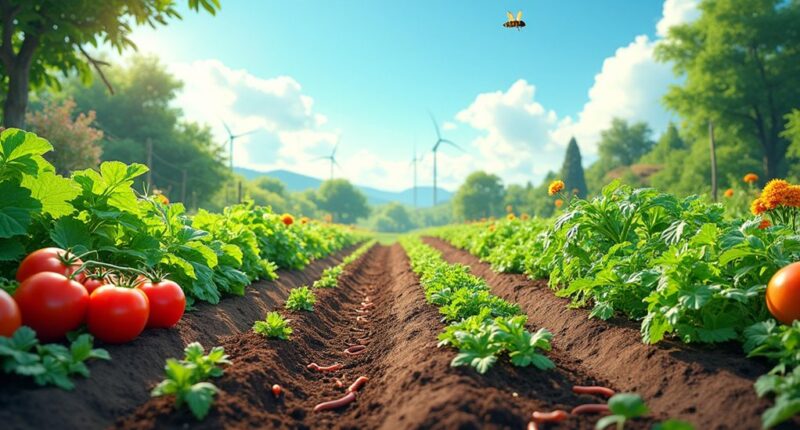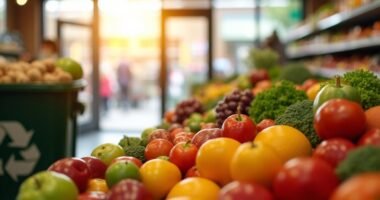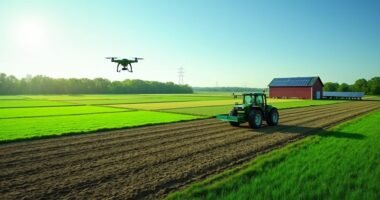New research showcases a planet-first diet as a sustainable solution to feed the world by 2050. This diet, rooted in the Planetary Health Diet, prioritizes plants and limits meat to reduce greenhouse gas emissions and prevent health issues. Imagine cutting those emissions in half while saving 11 million lives! However, shifting to such a diet isn’t just about what’s on our plates—equity and fairness must guide policies to guarantee everyone can join the feast. Curious about how we can achieve this?
Quick Overview
- A Planetary Health Diet prioritizes plant-based foods, significantly reducing greenhouse gas emissions by half while improving global health outcomes.
- Shifting diets can prevent 11 million premature deaths from chronic diseases and address the pressing issue of food insecurity.
- Sustainable food systems can generate $5 trillion annually, emphasizing the need for inclusive investment and equitable policies to support marginalized communities.
- Current food systems disproportionately impact vulnerable populations, highlighting the necessity for fair labor practices and community involvement in policy-making.
- Implementing waste management strategies and promoting plant diversity are crucial for maintaining planetary boundaries and ensuring long-term food security.
The Urgency of Sustainable Food Systems
What if the very systems that sustain us are also pushing the planet to the brink?
Food systems, responsible for about 30% of global greenhouse gas emissions, are in dire need of transformation. The current methods not only breach planetary boundaries but also exacerbate inequities, with the wealthiest 30% causing over 70% of environmental impacts. As food insecurity looms for millions, investment in sustainable practices remains grossly inadequate. Imagine reshaping our food systems to yield $5 trillion annually—it’s like finding a hidden treasure that benefits everyone. Shifting global diets could prevent up to 15 million premature deaths annually, highlighting the urgency for change. Adopting waste management strategies throughout the food supply chain could significantly reduce environmental impact while improving resource efficiency. In fact, agrifood systems currently receive only 7.2% of global climate finance, underscoring the critical need for increased investment. The urgency for change is real; our planet—and our plates—depend on it.
Embracing the Planetary Health Diet
Food systems are not just about what ends up on our plates; they’re a reflection of our values, priorities, and the health of our planet.
Embracing the Planetary Health Diet means prioritizing plants—think veggies, fruits, and legumes—while keeping meat to a mere cameo role.
Imagine a plate full of color instead of gray!
This diet promises to prevent 11 million deaths annually and cut greenhouse gas emissions in half. Additionally, it emphasizes plant diversity and judicious seafood use to reduce ecological footprints, with the potential to prevent 11.1 million deaths from chronic diseases globally.
Plus, it’s adaptable; whether you’re in Denmark or Italy, there’s a version for you.
It’s not just good for health—it’s a delicious way to care for our Earth!
True sustainability requires recognizing communities’ food sovereignty rights when implementing global dietary recommendations.
Ensuring Equity and Justice in Food Transition
While the journey toward a sustainable food system may seem challenging, it is essential to recognize that ensuring equity and justice is not merely an afterthought—it’s a fundamental pillar of this transformation.
Current food systems disproportionately burden marginalized communities, with the wealthiest 30% causing over 70% of environmental impacts. Moreover, 1.4 million people facing catastrophic levels of food insecurity globally underscores the urgency of this issue.
To create real change, policies must prioritize fair wages and labor rights, securing decent livelihoods for all workers. Creating fair pathways to sustainable food economies requires protecting vulnerable communities during the transition period.
Moreover, local voices must shape food policies, making sure no one is left behind. After all, a truly sustainable diet cannot thrive on exclusion; it needs everyone at the table—equally fed and heard. Food systems drive five of nine planetary boundaries already breached, highlighting the urgent need for inclusive and equitable solutions.









